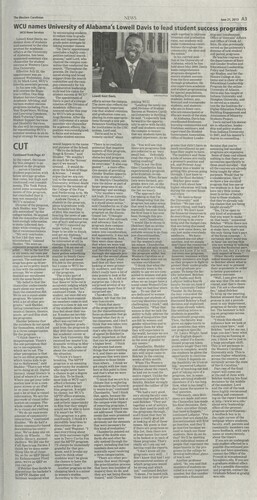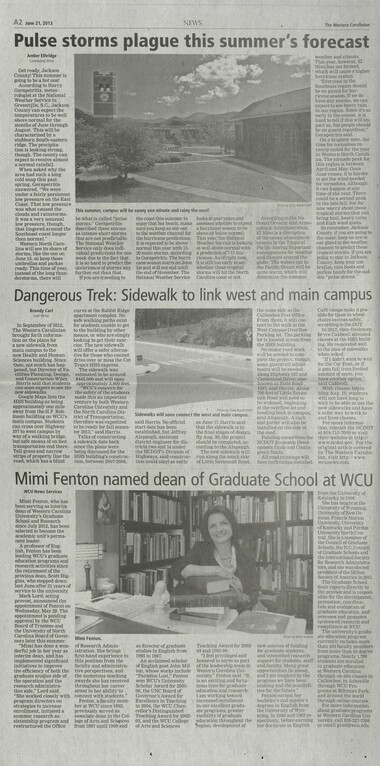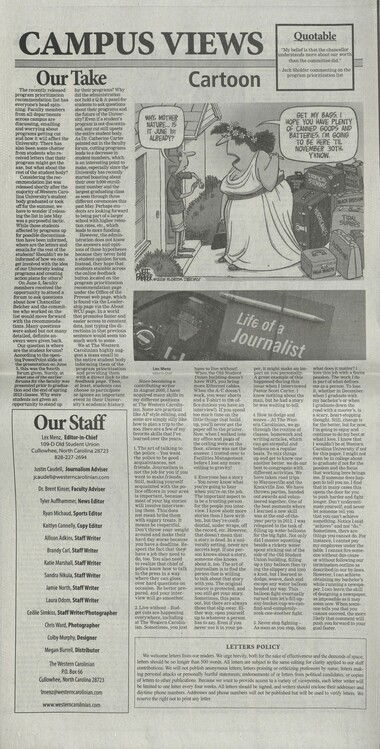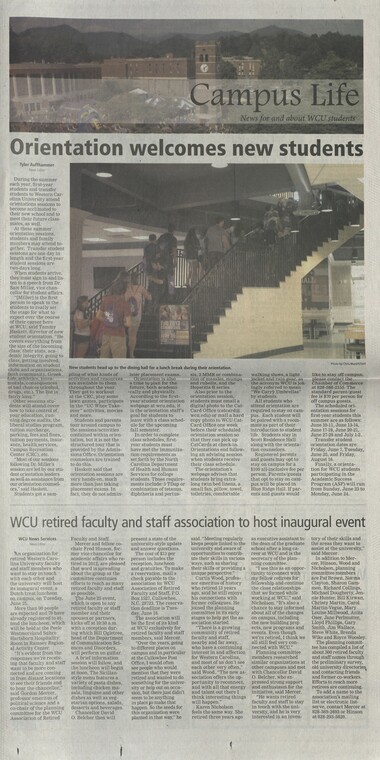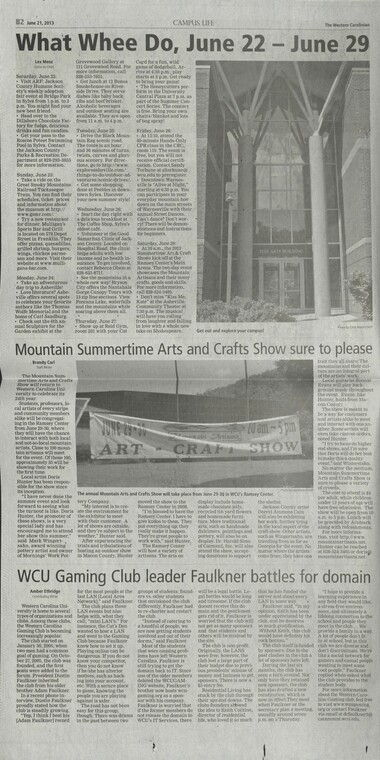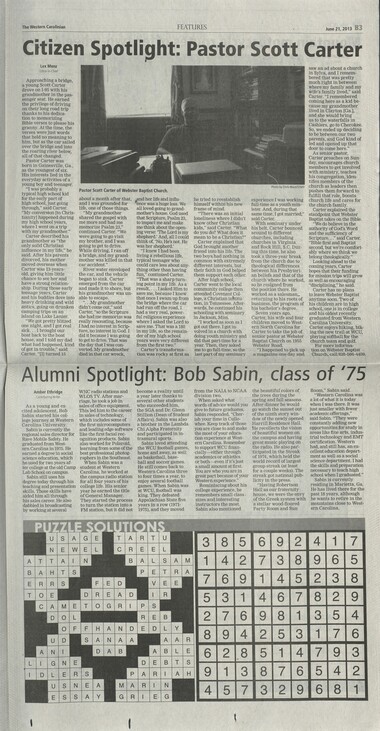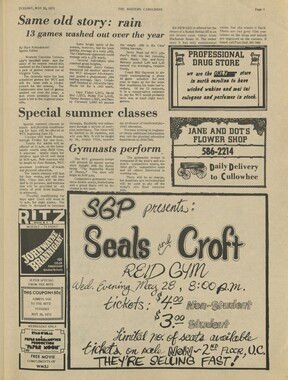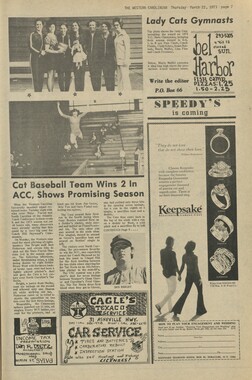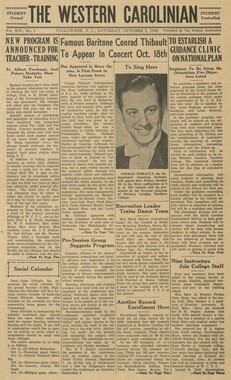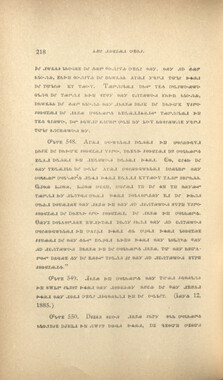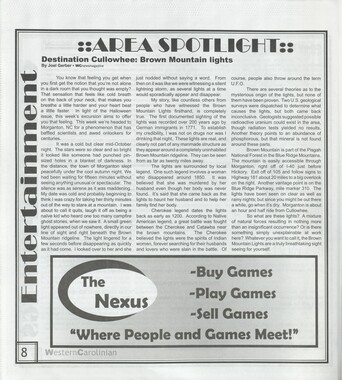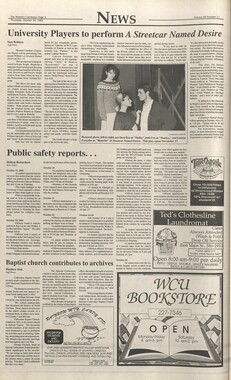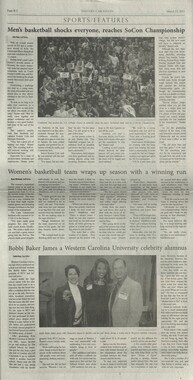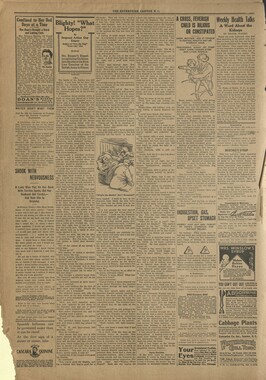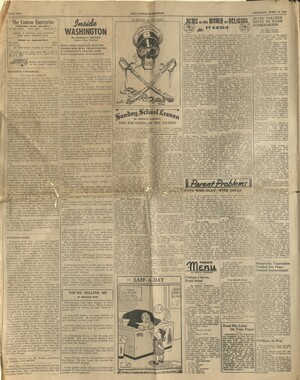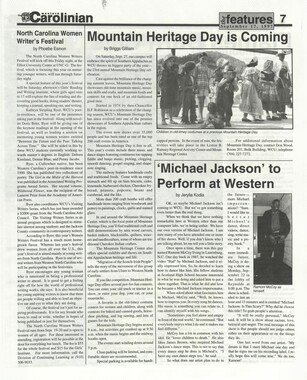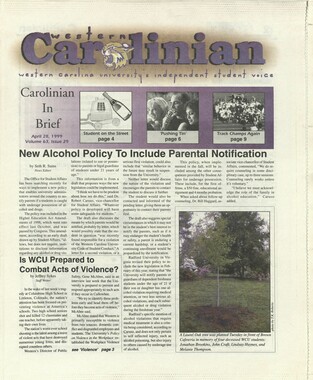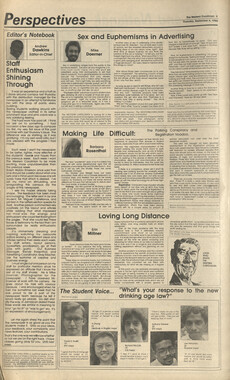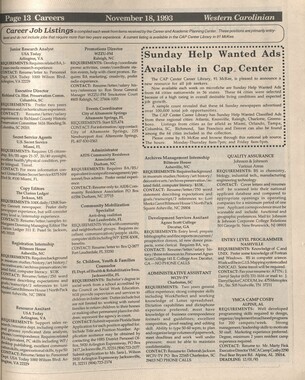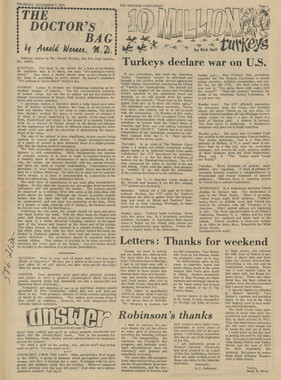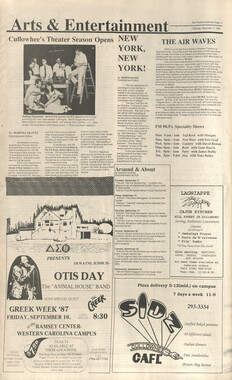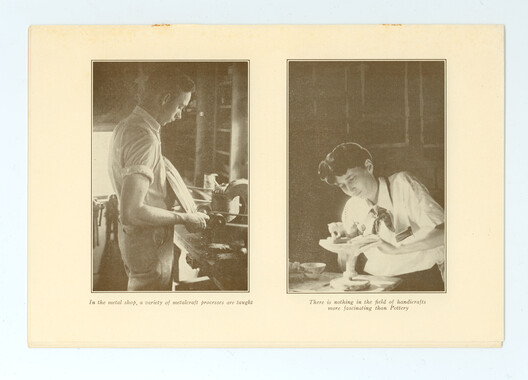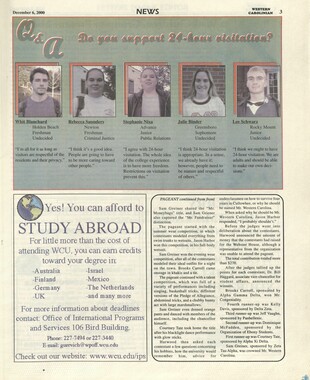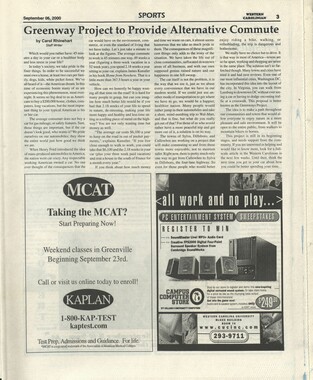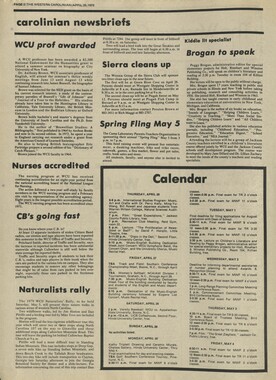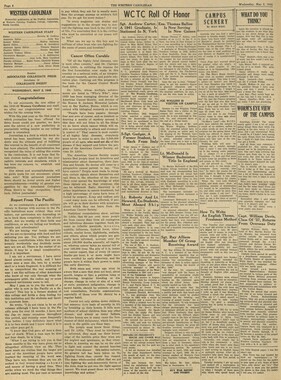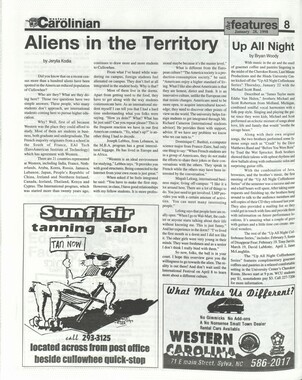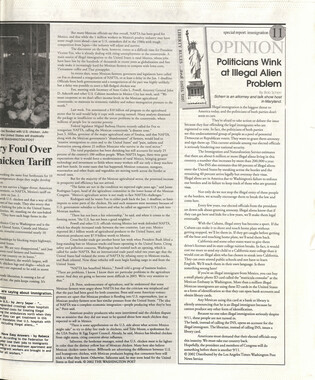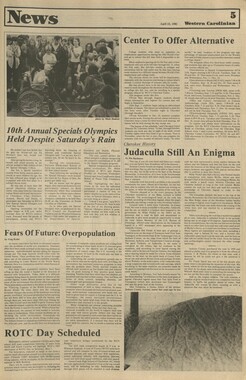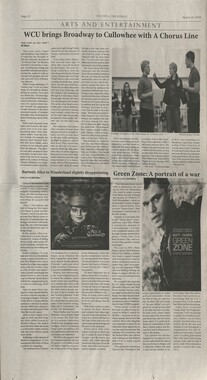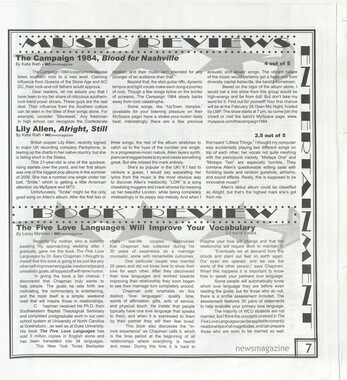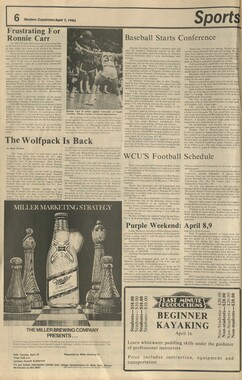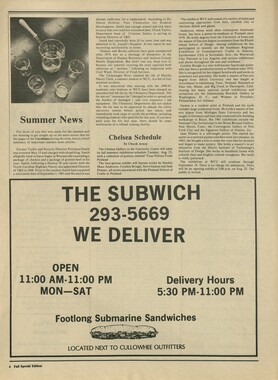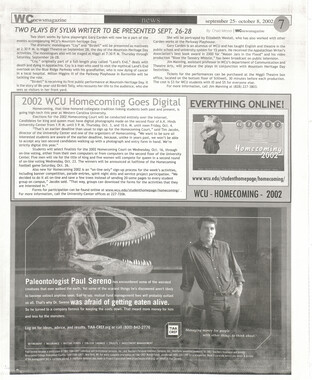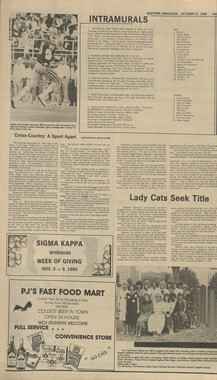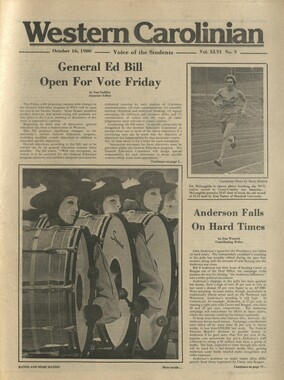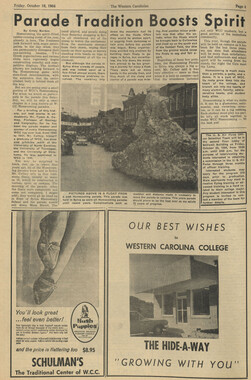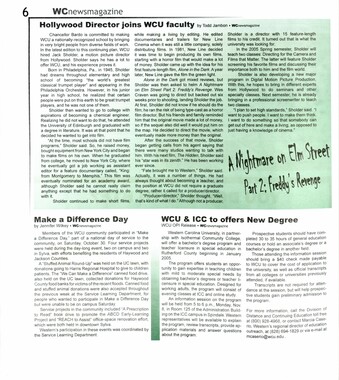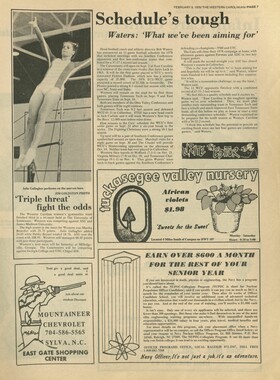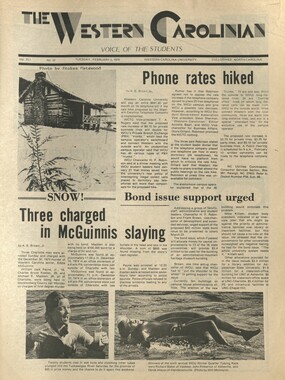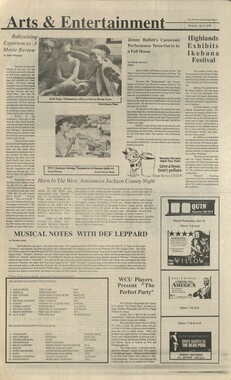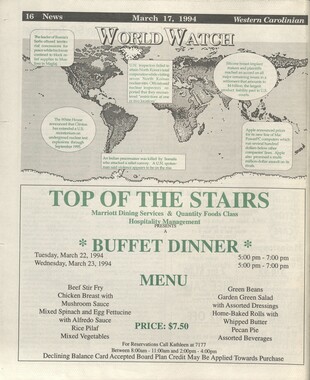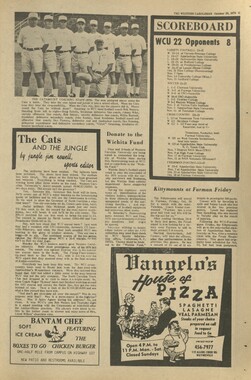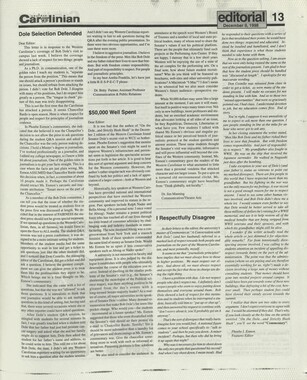Western Carolina University (21)
View all
- Canton Champion Fibre Company (2308)
- Cherokee Traditions (291)
- Civil War in Southern Appalachia (165)
- Craft Revival (1942)
- George Masa Collection (137)
- Great Smoky Mountains - A Park for America (3182)
- Highlights from Western Carolina University (422)
- Horace Kephart (998)
- Journeys Through Jackson (159)
- LGBTQIA+ Archive of Jackson County (90)
- Oral Histories of Western North Carolina (318)
- Picturing Appalachia (6617)
- Stories of Mountain Folk (413)
- Travel Western North Carolina (153)
- Western Carolina University Fine Art Museum Vitreograph Collection (129)
- Western Carolina University Herbarium (92)
- Western Carolina University: Making Memories (738)
- Western Carolina University Publications (2491)
- Western Carolina University Restricted Electronic Theses and Dissertations (146)
- Western North Carolina Regional Maps (71)
- World War II in Southern Appalachia (131)
University of North Carolina Asheville (6)
View all
- Allanstand Cottage Industries (62)
- Appalachian National Park Association (53)
- Bennett, Kelly, 1890-1974 (1463)
- Berry, Walter (76)
- Brasstown Carvers (40)
- Carver, George Washington, 1864?-1943 (26)
- Cathey, Joseph, 1803-1874 (1)
- Champion Fibre Company (233)
- Champion Paper and Fibre Company (297)
- Cherokee Indian Fair Association (16)
- Cherokee Language Program (22)
- Crowe, Amanda (40)
- Edmonston, Thomas Benton, 1842-1907 (7)
- Ensley, A. L. (Abraham Lincoln), 1865-1948 (275)
- Fromer, Irving Rhodes, 1913-1994 (70)
- George Butz (BFS 1907) (46)
- Goodrich, Frances Louisa (120)
- Grant, George Alexander, 1891-1964 (96)
- Heard, Marian Gladys (60)
- Kephart, Calvin, 1883-1969 (15)
- Kephart, Horace, 1862-1931 (313)
- Kephart, Laura, 1862-1954 (91)
- Laney, Gideon Thomas, 1889-1976 (439)
- Masa, George, 1881-1933 (61)
- McElhinney, William Julian, 1896-1953 (44)
- Niggli, Josephina, 1910-1983 (10)
- North Carolina Park Commission (105)
- Osborne, Kezia Stradley (9)
- Owens, Samuel Robert, 1918-1995 (11)
- Penland Weavers and Potters (36)
- Roberts, Vivienne (15)
- Roth, Albert, 1890-1974 (142)
- Schenck, Carl Alwin, 1868-1955 (1)
- Sherrill's Photography Studio (2565)
- Southern Highland Handicraft Guild (127)
- Southern Highlanders, Inc. (71)
- Stalcup, Jesse Bryson (46)
- Stearns, I. K. (213)
- Thompson, James Edward, 1880-1976 (226)
- United States. Indian Arts and Crafts Board (130)
- USFS (683)
- Vance, Zebulon Baird, 1830-1894 (1)
- Weaver, Zebulon, 1872-1948 (58)
- Western Carolina College (230)
- Western Carolina Teachers College (282)
- Western Carolina University (2008)
- Western Carolina University. Mountain Heritage Center (18)
- Whitman, Walt, 1819-1892 (10)
- Wilburn, Hiram Coleman, 1880-1967 (73)
- Williams, Isadora (3)
- Cain, Doreyl Ammons (0)
- Crittenden, Lorraine (0)
- Rhodes, Judy (0)
- Smith, Edward Clark (0)
- Appalachian Region, Southern (3032)
- Asheville (N.C.) (1945)
- Avery County (N.C.) (26)
- Blount County (Tenn.) (200)
- Buncombe County (N.C.) (1680)
- Cherokee County (N.C.) (283)
- Clay County (N.C.) (556)
- Graham County (N.C.) (247)
- Great Smoky Mountains National Park (N.C. and Tenn.) (535)
- Haywood County (N.C.) (3573)
- Henderson County (N.C.) (70)
- Jackson County (N.C.) (4926)
- Knox County (Tenn.) (61)
- Knoxville (Tenn.) (21)
- Lake Santeetlah (N.C.) (14)
- Macon County (N.C.) (421)
- Madison County (N.C.) (216)
- McDowell County (N.C.) (39)
- Mitchell County (N.C.) (135)
- Polk County (N.C.) (35)
- Qualla Boundary (982)
- Rutherford County (N.C.) (78)
- Swain County (N.C.) (2187)
- Transylvania County (N.C.) (270)
- Watauga County (N.C.) (12)
- Waynesville (N.C.) (86)
- Yancey County (N.C.) (72)
- Aerial Photographs (3)
- Aerial Views (60)
- Albums (books) (4)
- Articles (1)
- Artifacts (object Genre) (228)
- Bibliographies (1)
- Biography (general Genre) (2)
- Cards (information Artifacts) (38)
- Clippings (information Artifacts) (193)
- Copybooks (instructional Materials) (3)
- Crafts (art Genres) (622)
- Depictions (visual Works) (21)
- Design Drawings (1)
- Digital Moving Image Formats (2)
- Drawings (visual Works) (185)
- Envelopes (115)
- Exhibitions (events) (1)
- Facsimiles (reproductions) (1)
- Fiction (general Genre) (4)
- Financial Records (12)
- Fliers (printed Matter) (67)
- Glass Plate Negatives (381)
- Guidebooks (2)
- Internegatives (10)
- Interviews (823)
- Land Surveys (102)
- Letters (correspondence) (1070)
- Manuscripts (documents) (618)
- Maps (documents) (177)
- Memorandums (25)
- Minutes (administrative Records) (59)
- Negatives (photographs) (6192)
- Newsletters (1290)
- Newspapers (2)
- Notebooks (8)
- Occupation Currency (1)
- Paintings (visual Works) (1)
- Pen And Ink Drawings (1)
- Periodicals (194)
- Personal Narratives (10)
- Photographs (12977)
- Plans (maps) (1)
- Poetry (6)
- Portraits (4573)
- Postcards (329)
- Programs (documents) (181)
- Publications (documents) (2444)
- Questionnaires (65)
- Relief Prints (26)
- Sayings (literary Genre) (1)
- Scrapbooks (282)
- Sheet Music (2)
- Slides (photographs) (402)
- Songs (musical Compositions) (2)
- Sound Recordings (802)
- Specimens (92)
- Speeches (documents) (18)
- Tintypes (photographs) (8)
- Transcripts (329)
- Text Messages (0)
- A.L. Ensley Collection (275)
- Appalachian Industrial School Records (7)
- Appalachian National Park Association Records (336)
- Axley-Meroney Collection (2)
- Bayard Wootten Photograph Collection (20)
- Bethel Rural Community Organization Collection (7)
- Blumer Collection (5)
- C.W. Slagle Collection (20)
- Canton Area Historical Museum (2110)
- Carlos C. Campbell Collection (564)
- Cataloochee History Project (64)
- Cherokee Studies Collection (4)
- Daisy Dame Photograph Album (5)
- Daniel Boone VI Collection (1)
- Doris Ulmann Photograph Collection (112)
- Elizabeth H. Lasley Collection (1)
- Elizabeth Woolworth Szold Fleharty Collection (4)
- Frank Fry Collection (95)
- George Masa Collection (173)
- Gideon Laney Collection (452)
- Hazel Scarborough Collection (2)
- Hiram C. Wilburn Papers (28)
- Historic Photographs Collection (236)
- Horace Kephart Collection (861)
- Humbard Collection (33)
- Hunter and Weaver Families Collection (1)
- I. D. Blumenthal Collection (4)
- Isadora Williams Collection (4)
- Jesse Bryson Stalcup Collection (47)
- Jim Thompson Collection (224)
- John B. Battle Collection (7)
- John C. Campbell Folk School Records (80)
- John Parris Collection (6)
- Judaculla Rock project (2)
- Kelly Bennett Collection (1482)
- Love Family Papers (11)
- Major Wiley Parris Civil War Letters (3)
- Map Collection (12)
- McFee-Misemer Civil War Letters (34)
- Mountain Heritage Center Collection (4)
- Norburn - Robertson - Thomson Families Collection (44)
- Pauline Hood Collection (7)
- Pre-Guild Collection (2)
- Qualla Arts and Crafts Mutual Collection (12)
- R.A. Romanes Collection (681)
- Rosser H. Taylor Collection (1)
- Samuel Robert Owens Collection (94)
- Sara Madison Collection (144)
- Sherrill Studio Photo Collection (2558)
- Smoky Mountains Hiking Club Collection (616)
- Stories of Mountain Folk - Radio Programs (374)
- The Reporter, Western Carolina University (510)
- Venoy and Elizabeth Reed Collection (16)
- WCU Gender and Sexuality Oral History Project (36)
- WCU Mountain Heritage Center Oral Histories (25)
- WCU Oral History Collection - Mountain People, Mountain Lives (71)
- WCU Students Newspapers Collection (1923)
- Western North Carolina Tomorrow Black Oral History Project (69)
- William Williams Stringfield Collection (2)
- Zebulon Weaver Collection (109)
- African Americans (390)
- Appalachian Trail (35)
- Artisans (521)
- Cherokee art (84)
- Cherokee artists -- North Carolina (10)
- Cherokee language (21)
- Cherokee pottery (101)
- Cherokee women (208)
- Church buildings (190)
- Civilian Conservation Corps (U.S.) (114)
- College student newspapers and periodicals (2012)
- Dams (115)
- Dance (1023)
- Education (222)
- Floods (63)
- Folk music (1015)
- Forced removal, 1813-1903 (2)
- Forest conservation (220)
- Forests and forestry (1198)
- Gender nonconformity (4)
- Great Smoky Mountains National Park (N.C. and Tenn.) (181)
- Hunting (47)
- Landscape photography (25)
- Logging (122)
- Maps (83)
- Mines and mineral resources (9)
- North Carolina -- Maps (18)
- Paper industry (38)
- Postcards (255)
- Pottery (135)
- Railroad trains (72)
- Rural electrification -- North Carolina, Western (3)
- School integration -- Southern States (2)
- Segregation -- North Carolina, Western (5)
- Slavery (5)
- Sports (452)
- Storytelling (243)
- Waterfalls -- Great Smoky Mountains (N.C. and Tenn.) (66)
- Weaving -- Appalachian Region, Southern (280)
- Wood-carving -- Appalachian Region, Southern (328)
- World War, 1939-1945 (174)
Western Carolinian Volume 78 Number 16
Item
Item’s are ‘child’ level descriptions to ‘parent’ objects, (e.g. one page of a whole book).
-
-
rt ms fav we POE LIF | | The Western Carolinian = NEWS June 21, 2013 AS WCU names University of Alabama Ss Lowell Davis to lead student success programs WCU News Services Lowell Kent Davis, as- ' sistant dean of students and assistant to the vice provost for academic affairs at the University of Alabama, has been appointed assistant vice chancellor for student success at Western Caro- lina University. Effective July 22, the - appointment was an- nounced Wednesday, June 12, by Mark Lord, WCUs interim associate provost. In his new role, Davis will oversee the Regis- trars Office, One-Stop Student Service Center, Academic Advising, and various student success programs including First Year Experience, Writing and Learning Comnions, Math Tutoring Center, Student Support Services and Disability Services. He also will be responsible for repositioning WCUs summer sessions as an in- tegral strategy for success by encouraging students -to reduce time to gradu- ation and improve their grade-point averages by taking summer classes. Dr. Davis appointment concludes a highly com- petitive national search process, said Lord, who chaired the campus com- . mittee that conducted the search. Throughout the process, Dr. Davis gar- nered strong and broad support from the search committee andthecam- . | pus community for his collaborative leadership style and his vision for student success at WCU, The appointment of Davis is part of a reorga- nization of the Division of Academic Affairs an- nounced earlier this year by WCUs late provost, Angi Brenton. After the 2011 retirement of a senior associate vice chancellor for academic affairs, the position was reconfigured to focus and enhance various student success - Lowell Kent Davis. efforts across the campus. The move also reflects the increasingly important role that student retention and graduation rates are playing in state appropria- tions through a new per- formance funding formula for institutions in the UNC system, Lord said. Davis said he is ex- tremely excited about Submitted Photo joining WCU. Leading the newly cre- ated Division of Student Success at Western Caroli- na University is thrilling, he said. I especially look forward to the opportu- nity to serve with faculty, staff and students across the campus to ensure that our students have an optimal experience. As we work together to increase - retention and graduation rates, our students will make tremendous contri- butions throughout the community, the state and the nation. In his current posi- tion at the University of Alabama, which he has held since May 2009, Davis leads comprehensive programs designed to ensure student success from the first semester through graduation. He also supervises academic and student programming for special populations, including first-generation students; lesbian, gay, bisexual and transgender students ; and students who are in foster care, who: ar emancipated or who are wards of the state. At Alabama, Davis has coordinated freshman learning communities and freshman seminars, and supervised the Student Government Association, Office of Student Leader- ship and Involvement, Office of Veterans Affairs . and Office of Greek Af- fairs. He also previously served as the universitys director of new student and parent programs. He teaches courses in the departments of Race and Gender Studies and Educational Leadership, Policy and Technol- ogy Studies, and for the Honors College at Ala- bama and is chair of the Educational Leadership Program for the online University of Atlanta. Davis also has taught at Indiana University and Hampton University, and he served as a consul- tant for the Institute for . Higher Education Policys Building Engagement and Attainment of Minority Students Project. Davis earned his doctor- ate in education, leader- ship and policy studies from Indiana University in 2007, and his masters degree in counseling. Continued from Page Al In the report, the cause. for this category is ex- plained as the program .. serves a limited student population with below average gradua- tion rates, but high and continued cost commit- ments. The Task Force noted some accomplish- ments of this program, but concluded that it . was not essential to WCUs mission. Director of the program, Jack Sholder, was liter- ally astonished by the categorization. He argued that the committee did not have enough information to make informed deci- sions while creating the list of recommendations. My only conclusion is that I felt they were misinformed, claimed Sholder. We were an expensive program at one point . .. but in the last five or six years, our costs per student have gone down 50 percent. The national av- erage has gone up 50 per- cent, So were pretty much in line with the national average. Weve almost doubled our enrollment with the same faculty. My belief is that the chancellor understands more about our worth than the committee did. We're not a stand-alone program. We interact with a lot of other pro- grams, said Sholder, listing interactions with musical theatre, theatre, music, art and film stud- jes programs. Sholder believes that the numbers do not speak for themselves, which led to a three categorization for the program. T think theres a misperception. Theres the one perception that we're too expensive, which were not. The other perception is that we're an elitist program, which trains kids to go out to Hollywood, said Sholder. Thats not what we're doing at all. Digital literacy, visual literacy is kind of where its at now. Where you get your infor- mation now is on a com- puter screen or an iPad or on your cell phone, and a lot of that is visual information. We are the purveyr of visual infor- mation on campus. The whole center of what we do is visual storytelling. We .do an enormous amount of community interaction, continued Sholder. We do half a - dozen community-based documentaries every year. Weve done one on Meals on Wheels... the public library, animal shelters. We did one for Full Spectrum Farms. I _ think weve done some- thing like 90 of these. So, as far as QEP [Qual- ity Enhancement Plan] goes, we're as QEP as you can get. If Belcher does decide to discontinue the bachelors in MPTP, Sholder and ~ Salzman wondered what would happen to the name . and purpose of the School. We're the School of Stage & Screen, said Sholder. We wouldnt do much for the Screen part if we werent around: . . It would de- stroy the School of Stage & Screen... I would argue that we are ten- tral to the mission of the University, without doubt central to the mission of the College ofthe Fine and Performing Arts. We touch every aspect of it. Andrew Dyson, a student in the program, plans to graduate with his bachelors in May of 2014. His reaction to hearing the news of pos- sible discontinuation was one of hurt and surprise. If WCU canceled my - major today, I would hope to be able to finish : and get my diploma, said Dyson. I would not be interested at all in changing to something similar. Im an out-of- _ state student. I could " have gotten something similar in South Caro- lina, and saved about $70,000 in the process, but I came to WCU be- cause of the uniqueness. of the program. The tricky part of making alist of majors . that deserve to be cut is accurately judging which ones belong on that list, continued Dyson. As a student, not once did any of the task force commit- tee members come in and observe a class or ask any of the students about how they feel about their ma- -jor. It makes me terribly disappointed in how this effort was carried out. Erin Wagoner gradu- ated from the program in May 2010 then continued her academic career at New York University. She received her masters in: _ dramatic writing in May 2012. She, too, spoke out about the unfairness of _ the situation. T think its heart- breaking. The MPTP program is an amazing opportunity for students who might never have a chance to get a degree like this. To be frank, most kids at WCU cant afford a famous art school with a fancy film program. It might be cheesy, but WCUs MPTP offers students, like myself, a creative and artistic opportunity in film that they simply would not be able to have if it wasnt for WCU. This program is a gem and frankly, I think its incredibly heartless to discontinue the pro- gram, said Wagoner. I owe everything about my little successes right now to Terry Curtis Fox and the MPTP program. I'l] always be immensely grateful for that pro- gram, and it breaks my heart to think other students wont be given the chance to have the experiences I had. Another program on the chopping block is a minor in womens studies. According to the report, There is no realistic potential that negative aspects of this program, . including curricular obstacles and program management issues, can be overcome. It also sug- gested ...a more effec- tive means of providing Gender Studies opportu- nities to our students. Dr. Marilyn Chamberlin runs the minor as part of larger programs in an- . thropology and sociology. Our numbers were not high. Its an interdis- ciplinary program that is a stand-alone minor, said Chamberlin on if she _ was surprised to see the program on the discon- tinued list: I thought that more of the outreach and advocacy that the program does campus- wide would have been taken into consideration, - and apparently, it was not. bythe committee. And, they were clear about that when we were told we had received a three, and therefore had to go through the appeals pro- cess for the second phase. .At that point, I real- ized that all they were - looking at were primar- ily numbers, and they didnt really have a lot of data points to look at for the minors. So, it did not surprise me. I think it surprised several of my colleagues more than it surprised me. Chamberlin, like Sholder, felt that the list was inaccurate. T think that many of the programs on the list [for discontinuation] focus on elements that go beyond what they do in the classroom, and I dont think that was taken into consideration. I think thats why this third stage of appeal [to Belcher] is really important, so that that can be presented at a higher level... I think the process had some things that were limiting to it, and there are some programs that were more sensitive to those limits than others. .. I think we got caught with low num- bers at this point in time, and thats what we were evaluated on. I think that we are ina climate that is exploring the direction the Universi- ty wants to go, continued Chamberlin, and I think that, again, because the committee did not look at the campus-wide impact of removing programs, I think that is where it was not addressed. Those ele- ments that were presented to the committee were obviously not the elements that were necessary for this kind of evaluation. Chamberlin pointed out some of the double stan- dards she and other fac- ulty noticed through the report, including that low numbers does not auto- matically equal receiving a three categorization. There are other pro- grams that went through the prioritization process that have less [number of majors] than we do, and they are not being discon- tinued, said Chamber- lin. You will see that there are programs that. are referred to as very small but. . Definitely read the report. Its fasci- nating reading! This is not the first time Chamberlin has experienced a program - prioritization recom- mendation. When former lists were formed, pro- grams were cut, so she and her staff are taking the list seriously. The approach that Im taking is that Im not disagreeing that the program has some areas that need to be adjusted, especially because this is the first time it has ever been through this pro- cess, said Chamberlin. T would like to stress to [Belcher] that an action plan would be a more suitable avenue to go than just discontinuation. If Belcher were to cut the womens stud-: ies minor, Chamberlin fears that not only would the students who are in the program suffer, but Western Carolina as a - whole would miss out on various enrichment. : T think that what the University loses is the ability to say we are com- mitted to women and gen- der issues on our campus when we no longer have a stand-alone Womens Cen- ter that we had four years ago. .. To say that we are dedicated to women students and students of varying identities is more challenging, I think, said Chamberlin. What that means is that we lack the ability to fully address the needs of inequalities that are felt by women and | gender minorities and to prepare them for what they will experience in the world, because we are still not an equal society in the area of gender by any means. Chamberlin, Sholder and other program direc- tors will argue cases to Belcher in the coming weeks of this month. When The Western Carolinian interviewed - Belcher about the report, he had yet to read the entire report. Unlike the concerns raised by the _ faculty, Belcher strongly praised the caliber of the task force. We had a very good, very strong faculty com- mittee that worked on it, said Belcher. They put together a set of metrics that they used to push all the programs through, and I trust that theyve done a really good job at looking at all of those issues. My guess is that if there are programs on this list, then there are | at least issues that need to be looked at in each of these programs. Thats really all I can say not having read the reports. TI dont know all the programs very well. ..1 dont know that had I any preconceived notions of which programs would be strong and which not, continued Belcher. T mean, Ive heard talk from time to time of pro- grams that didnt have as much enrollment as per- haps they ought to have. . . The numbers and those kinds of issues are really ' a provosts position and job, and Provost Angi Brenton was a leader in getting this process going through. I just have to make the final decision. Belcher gave some frank truth about how higher education will look during the current finan- cial crisis. . .We have to focus the University, said Belcher..We just cant do everything, and thats part of it. We dont have the financial resources to do everything, and if we keep trying to do every- . thing and the budget cuts that are being discussed right now come down, we can just make everybody mediocre... We have sustained one cut after another, and we simply - dont have the resources. Belcher said that he - does not know if he will | - cut even one program, however, tensions within faculty members are high _as they prepare to fight to protect their undergradu- -ate and graduate pro- grams. To keep the fac- ulty informed, Belcher, Lord, Szabo and Beth Lofquist held a fourth faculty forum on June 5 in the University Center Theater. In the forum, the four reiterated the prioritization process, discussed Belchers final decision and explained the steps already taken, like sending letters to students in possible discontinued programs. Then, the faculty was given an opportunity to ask questions that were not program specific. - Dr. Laura Wright, head of the English depart- ment, asked if a discon- tinued program takes students longer than two years to.complete, would the students be given the opportunity to continue. 1 think it depends on the feasibility on truncat- ing, answered Lofquist. Part of teaching out and part of taking care of a program, too, is some- times advising students elsewhere if its too long. Now, what is too long? I dont know the answer to that question. Obviously, once deci- sions are made and once the Chancellor has made his final decisions, then. .. there are other things that have to happen, continued Lofquist. Pro- grams that are slated for discontinuation will first go inactive, and theyll go inactive because we need to teach out those students. How do we do that? Well be meeting with individual teams of people that represent the departments in the pro- grams in the college to develop individual plans. of teach-out. Another professor asked, So, you said that numbers of students en- rolled is a very important number, but that number represents a financial decision that youre assuming low enrolled programs are expensive. . . Some of them cost almost nothing in that there are no courses specifically to those small enrolled that all the courses are already being taught for other :' purposes. Would that be a consideration, like if we have a low enrolled program that has one or two students in it, but we have very little invest- ment in terms of faculty time to those students, that theyre already tak- : ing classes that are being taught already? Yes, Id be open to any kind of argument that you want tomake | on that basis, answered Belcher. While there are financial issues certainly at stake here, thats not the only thing thats part of the focus concept. ). . 1 certainly dont want you _ to hear me saying that | you are wrong in enane about the financial part. You're not, but its not the only aspect of focus. Other faculty members ; asked teasing questions ; to Belcher about what is the best way to present their arguments in order to better guarantee a positive outcome. Well, I can give you one way that Im not con- vinced, and thats choco- late. Im not a chocolate fan, joked Belcher. To wrap up the meeting, Belcher stressed that this process is not a punish- ment to any department, program or faculty mem- ber. The hammer is fall- ing on programs across _the nation. I think this should influence how we look at curriculum here, said Belcher, and let me say, I hope you dont hear what Im saying as fussing at you. I think we're just in a huge paradigm shift. This is not germane to the Western Carolina University only. This is across higher education, across the country, and certainly across the state of North Carolina. Part two of the final report will come out at the end of June with Belcher making his final decisions by the middle of the summer. Lord and the rest of the task force highly recommend reading and comment- ing on the report located at http://www.wcu.edu/ about-wcu/leadership/ office-of-the-provost/ program-prioritization/. A feedback box is in the right corner of the webpage where students, faculty, staff, parents and community members can leave feedback, with ones name or anonymously, about the report. If you are an undergrad- uate student affected by a possible discontinued pro- * gram and have questions, contact the Office of the Provost at veacademicaf- fairs@weu.edu. If you are a graduate student affect- ed by a possible discontin- ued program, contact the Graduate School at grad@ weledu.
Object
Object’s are ‘parent’ level descriptions to ‘children’ items, (e.g. a book with pages).
-
The Western Carolinian is Western Carolina University's student-run newspaper. The paper was published as the Cullowhee Yodel from 1924 to 1931 before changing its name to The Western Carolinian in 1933.
-

